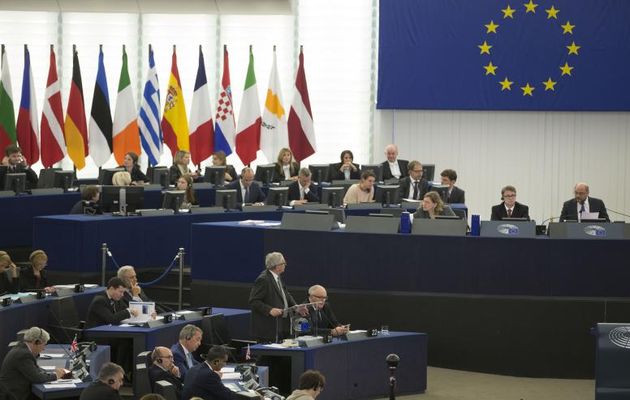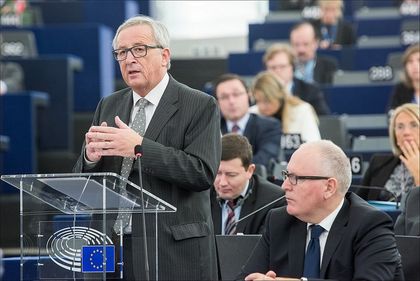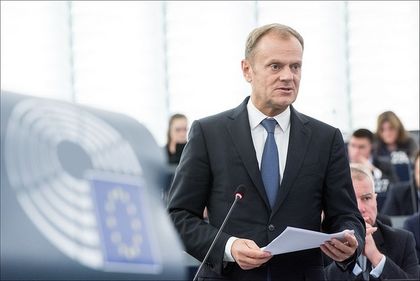Tackling the refugee crisis in the European Parliament
Refugee flows on the Balkans route, cooperation with Turkey and talks with African countries, as well as the funds needed to tackle these challenges, have been debated .
EU Comission, EurActiv · STRASBOURG · 27 OCTOBER 2015 · 17:10 CET

European Commission President Jean-Claude Juncker made an appeal to the European Parliament, and to member states, to find innovative ways of financing the migrant crisis, as the EU coffers are running dry.
Juncker addressed MEPs in Strasbourg to debrief them following the last EU summit on migration on 15-16 October, and the mini-summit held with the countries of the “Western Balkans route”.
Juncker said the refugee crisis also affected the European institutions, and their contribution was very urgent in terms of budget contributions. He thanked the Parliament for having backed all of the Commission’s proposals in terms of financing management of the crisis.
FINACING THE CRISIS
The Commission President said that at the last summits, all heads of state and government stressed the huge cost of the refugee crisis. He said he understood them, and that’s why on 15 October, the executive told EU member states that when interpreting the Stability and Growth Pact, it would add a dose of flexibility in interpreting budget deficits, as this was an issue of exceptional gravity.
Several eurozone governments have asked for more flexibility on EU fiscal rules - the Stability and Growth Pact- to cope with the costs of the migrant crisis.But Juncker added that flexibility will apply on a country-by-country basis. Even among large EU countries, some were not making a big effort, he said.
“The gap between pledges and what is on the table must be reduced, otherwise we are losing all credibility”, Juncker said. He added that the Commission would allocate €10 billion from its budget to tackle the refugee crisis, raising this amount from a previous figure of €4.2 billion.

"Member states need to do more and keep the promises they made at the 23 September summit. Member states are still walking slowly at a time when they should have started to run", the President argued.
Talking about the refugees , he continued:"No registration, no rights, it is as simple as that. Refugees have rights but they have obligations too!"
TURKEY AND AFRICA
Speaking about Turkey, he mentioned the common action programme: "We know there are shortcomings but we need to involve Turkey in our initiatives. We need to ensure that no more refugees come from Turkey to the EU. Many refugees come to Turkey with a view to moving to EU countries."
In November, the Valetta summit on migration with the Africa countries will take place. “I don’t want to arrive in Valetta with promises not kept," Juncker said.
“How can we engage in a serious and responsible dialogue with our African cousins if we are unable to keep the promises we made to them? We need to arrive in Valetta with pockets full not only with promises, but with promises kept", he said.
“The fact that I needed to call this meeting shows that the EU is not in as good a state as it should be. I would very much prefer not to call such a summit," Juncker said.
“THE BIGGEST CRISIS”
Despite agreements on boosting the number of reception centres and deploying more police officers, European Parliament President Schulz said he left the talks feeling "deeply worried".

"Promises are being made and they're not delivered upon," he said. "Governments of the right and of the left sometimes think national interests are more important than community solutions. What suffers are the refugees and the cohesion of the European Union", Schulz concluded.
"The crisis, or rather challenge that all of us are facing now is perhaps the biggest we have seen for decades. I have no doubt that it has the potential to change the European Union we have built. It has the potential even to destroy achievements such as border-free travel between Schengen countries”, European Council President, Donald Tusk, warned.
Tusk continued: "These are truly extraordinary times that require extraordinary measures, extraordinary sacrifices, and extraordinary solidarity."
FIGURES RISING
Slovenia's police said on Monday that nearly 10,000 migrants had arrived from Croatia in the past 24 hours. More than 9,000 arrived in Greece every day last week - the highest rate so far this year.
The latest figures from the UNHCR - showing that more than 700,000 people have reached Europe via the Mediterranean this year - mark a staggering increase on last year, our correspondent says.
UNHCR says most arrivals are not economic migrants, but people fleeing war and persecution. The conflict in Syria continues to be the biggest driver of the migration.
Published in: Evangelical Focus - europe - Tackling the refugee crisis in the European Parliament
